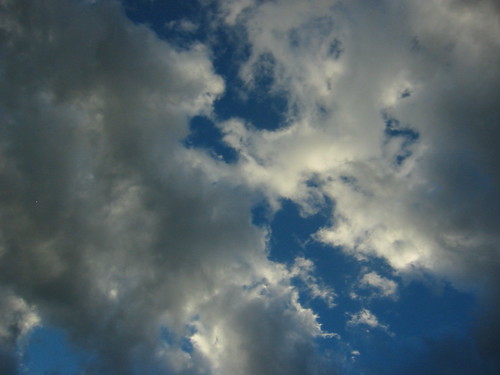
Some Clouds
Endlessly repeating oneself, exhausting a means by moot’d placidity and usual recompense. The orange sun thwack’d into a fat mitt of clouds. Loafing (pallet, flung-down greatcoat) with a vague
honorary sense of the impinging emptiness, its collateral needs. Sense of the ongoing undoctor’d world in revelatory abeyance. The whitish-green slip of a monocotyledonous tendril easing out of blood-clot red cuff of its seed jacket, butting “at” the cold earth. Unmonitor’d swellings. Barthes (
The Grain of the Voice): “I’m unable, unwilling, to sum up a book, to efface myself behind a capsule description of it on an index card, but on the contrary, I’m quite ready to pick out certain sentences, certain characteristics of the book, to ingest them as discontinuous fragments. This is obviously not a good philological attitude, since it comes down to deforming the book for my own purposes.” To keep everything moving, a rude indecent ploy: a self-center’d implausible fidgeting, a thing launch’d in solitary, against the crowd. Chaos unwitness’d, ideology unkempt, ransack’d, pliable,
unpurchased. Pasternak, talking of “societies of every sort”: “Gregariousness is always the refuge of mediocrities.” (See Emily Dickinson—“Then—shuts the Door— / To her divine Majority—”) Moving out and back along a changeable trajectory (the unphotograph’d cherry orchards near Paw Paw, gawky seedlings wrap’d in dirty bandages against the invading purity of snow): the way one carps against what one is beholden to. Philip Guston (out of
Collected Writings, Lectures, and Conversations), talking about Toulouse-Lautrec, applauding the “absolute attention to what he’s seeing and what moves him. I mean a face, a figure, a gesture, a movement, and so on, and when the feeling runs out he stops too. . . . So you’re faced with the curious mystery of a fix, like a momentary fix, or a record, an evidence of a man observing something with such intensity.” And Guston
turns to Toulouse-Lautrec’s drawings of animals in Jules Renard’s
A Bestiary, “struck by how he sees. . . .
what he sees”:
Every kind of animal is there, a goose, a swan, a frog, etc., etc. And there’s a bull. And that bull is, to me, one of the most remarkable drawings in the book. It really looks like a vast landscape, as if the bull was right in front of his nose, he started drawing the tail and the hip, and he goes on this back and you can just feel it going on and on and on. And finally somewhere way over on the right are a couple of horns, and the whole feeling about this bull, this vastness of it, is that he must have been so close. He doesn’t bother to define the bull so much. The legs kind of peter out. But what he saw was this back.
And, honing the exclamatory by broadening it:
I think what I’m saying is that the immersion in the bull finally produces the most unpredictable thing, that he wouldn’t get either if he had thought of making a picture, or of drawing a bull. I mean, he somehow lost himself, was capable of losing himself, immersing himself in visual phenomena . . . I’m not giving a lecture, I just am proposing that kind of immersion, whether it’s being driven by concept or by visual phenomena, somehow seems to me to be . . . more fruitful, more chaotic but fruitfully chaotic, more unpredictable, that what we can conceive of when we become interested in painting itself. In other words I am proposing that painting needs more than itself. I suppose it’s a very traditional point of view.
Recalling Barthes talk of the ephemerality and radical
repleteness of haiku, how it is concern’d with “a
hyperconsciousness . . . acute, pure consciousness, with no interposition.” He, too (
The Preparation of the Novel) referring (as counter-exemplary) to Jules Renard’s
Histoires naturelles, the “brief notations, always metaphorical, taken directly from Nature (which actually means the countryside)” a kind of “
impression (altogether contrary to the haiku).” The lack: seemingly “a kind of mounting agitation, a sustained “infra-panic” that’s almost of the order of good manners . . . Tenuousness and concentration: fleeting concentration of emotion.” So (Renard per Barthes): “‘
The cockroach. Black and sticky, like a keyhole.’ ‘
The spider. A little hand, black and hairy, clutching strands of hair. All night long, on behalf of the moon, it affixes seals.’ . . . ‘
The raven. Grave accent on the furrow.’ ‘
The lark. It lands, dead drunk from having . . . poked the sun in the eye again.’” Against the full-pot’d stirrings of discourse, its batting at containment: slips of desire
dibble’d (pointedly) into the mud. Against desire’s consuming itself in protract’d rigmarole and diffusion: a suasion, a lean, a cusp. Barthes (
The Grain of the Voice):
The haiku is something else again: it’s the essential, musical future of the fragment, its form of becoming. I encountered it in its real and historical nature during my travels in Japan. I have a profound admiration, that is, a profound desire, for this form. If I imagine myself writing other things, some of them would be on the order of the haiku. The haiku is a very short form, but unlike the maxim, an equally short form, it is characterized by its matteness. It engenders no sense, but at the same time it is not nonsense. It’s always the same problem: to keep meaning from taking hold, but without abandoning meaning, under the threat of falling into the worst meaning, nonmeaning.
And Barthes refers pointedly to the “anamneses” of
Roland Barthes—“memories of my childhood and youth, given in a few sentence at most, which have the characteristic . . . of being absolutely matte. Not solidified.” Guston’s “momentary fix.”

Henri de Toulouse-Lautrec, “Le Taureau,” Jules Renard’s Histoires Naturelles, 1897

Henri de Toulouse-Lautrec, “Canards,” Jules Renard’s Histoires Naturelles, 1897

Jules Renard, 1864-1910




























